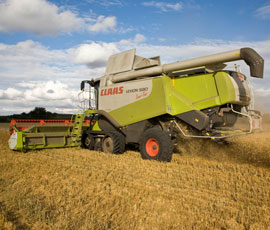Wheat harvest 90% complete, says ADAS

Farmers managed to cut 900,000ha of crops between 5 and 11 September, including 700,000ha of winter wheat, according to the latest report from ADAS.
“Progress for the end of wheat harvest 2012 is now back in line with the five-year average, at 90% complete,” it said.
“Cereal harvest in Southern England is now nearing completion, although pockets with wet soils or waiting on contractors do remain.
“In northern England and Scotland harvest is well underway, with large areas of spring barley and winter wheat now harvested.”
Speed of travel remained slower than normal, with high straw volumes and wet soil conditions slowing combines down, said the report.
By Tuesday (11 September), 90% of the GB wheat area had been cut, with yields below average at 7.1-7.4t/ha.
“Light land is performing better than normal, while heavy land is performing below normal.”
Specific weights were typically below 70kg/hl and Hagberg falling numbers were starting to drop, with the week’s average at 200 seconds.
“In Scotland, wheat harvest started this week, with only about 15% of the wheat harvested by 11 September,” added the report.
Spring barley harvest was 70% complete across GB, with the Scottish crop about 57% cut.
“Yields are slightly below average, at 5.1-5.4t/ha. Specific weights are low at 60-62kg/hl and grain nitrogen is variable but low.”
Winter barley harvest was all but complete, with just a few fields left to cut in Scotland.
Yields were slightly above average, but high screenings were common in Northern England and Scotland, said the report.
Spring oat harvest was now underway, with overall oat yields close to average at 5.6t/ha.
“Yields have been very variable, with good yields reported in the East Midlands of up to 9t/ha, while in the Eastern region oats have not performed well, with yields dropping as low as 3.5t/ha.”
Winter rapeseed yields were above average, at 3.4-3.6t/ha, although oil contents were low, at 40-45%.
The spring rapeseed harvest was 40% through, and early yields were disappointing, at 2.1t/ha, it added.

